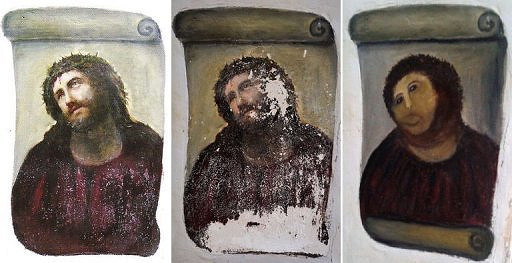Alumni professionals are often required to just "wing it" until they can master certain skills. Are you doing enough to train your staff for the skills they need to succeed?
About a 6 minute read.

Before and after "restoration" of the Ecce Homo fresco at the
Sanctuary of Mercy Church in Borca, Spain (image: Wikipedia)
You may recall the recent uproar over the botched “restoration” of the “Ecce Homo” (Behold the Man) fresco by Spanish artist Elias Garcia Martinez.
Cecilia Gimenes, an 82-year old untrained artist and parishioner admitted to “fixing” the fresco. Her work has been referred to as “the worst art restoration in history.” Her "artwork" spawned a deluge of disparaging social media criticism, snarky memes, and a few irreverent Saturday Night Live skits.
Fortunately, our lack of certain skills are not likely to spur a global snark-fest, but as alumni professionals, it's not uncommon that a lack of skills can result in botched opportunities, under-performing programs, or disappointing engagement rates. More often than not, the root cause of these failures is a lack of knowledge and training.
So if you'll indulge my less than ideal metaphor, I'd like to use Ms. Gimenes as a springboard to discuss the critical need for more skills development opportunities in alumni relations.
Generalists vs. Specialists
Before Cecilia Gimenes started work on the Ecce Homo, she had a reputation as being a somewhat proficient landscape artist. But when it came to portrait art, her lack of skills was a disaster.
In the art world, trained artists learn techniques that can greatly enhance the quality of their work. It's unlikely that an amateur who just "wings it" will create something of enduring value.
Likewise, the techniques necessary to run a successful alumni organization increasingly demand ongoing and specific training. While we all accept the fact that alumni staff must wear many hats, do we realize that our lack of specialized skills can waste time and lead to costly mistakes?
Most alumni professionals are hired as generalists , with expectations that over time, their performance can be elevated to the level of a specialist in specific assigned disciplines. In other words, we fake it until we make it, and it seems many of us have elevated our need to "wing it" to an art form.
The reasons for this phenomenon are often systemic and difficult to overcome. For example, we often hire new alumni staff from the ranks of institutional fundraising, university PR/marketing or annual fund. What differentiates these candidates usually is not a high proficiency in a specific skill, but rather their familiarity with the advancement process, who they know, or their inside knowledge of the institution's bureaucracy.
The required knowledge of alumni relations professionals has become increasingly complicated over the past few decades. Gone are the halcyon days where alumni staff primarily focused on planning reunions, meet-and-greets, and homecoming events. Today's alumni professionals must master many complex and highly specialized skills, such as:
- Understanding business and marketing analysis, market structures, segmentation, consumer behavior, accounting, finance, and enterprise strategy.
- Social marketing, along with an understanding of how to create actionable reporting analytics that direct the organization’s ongoing business decisions.
- Conducting scientific research and analysis aimed at identifying trends and directing programming decisions.
- Writing relevant and persuasive content that engages alumni of all demographics.
- Understanding, trouble-shooting and managing IT resources like SaaS databases, cloud computing, SEO, web design, CSS, HTML, web analytics, m-commerce, mobile optimization, etc.
When compared to alumni relations skills of a generation ago, the bar has clearly been raised. But has your staff development plan kept pace with the changes?
What's Your Approach to Staff Development & Training?
If you are an alumni and/or advancement decision maker with the responsibility for staff development, are you doing enough to keep your staff up-to-date on their skills? Here are some questions to ask yourself about your program:
Is training your staff a “necessary evil” that seems to be a drag on your budget, or do you see staff development as a way of expanding your capacity?
Are you afraid of training your staff and then losing them once they’ve developed new skills, or is it more costly to keep your staff poorly trained?
Do you give your staff frequent opportunities for training?
Do you dictate the conferences or training your staff will attend, or do you offer them the flexibility to help select their own conferences?
Are some or all of your professional staff excluded from new learning opportunities, and if so, why?
Do you encourage your staff to attend webinars during work hours?
Does your institution have a policy about free or discounted courses, and if so, is your staff free to pursue these courses? Have you looked into MOOC classes that offer free or low cost lectures, readings and training materials on relevant topics?
Does your employee review process reward staff members who seek out additional training?
New staff just entering alumni relations are often better served by attending a CASE conference or attending an alumni marketing conference like CAMMP or WCMG. But have you considered sending your seasoned staff to non-education focused training to learn skills in digital media, IT service management, or content marketing, or any other skill your office may be lacking?
For executives, are you seeking opportunities to purposefully stretch your skills? Are you exposing your brain to new ideas that may challenge your operating assumptions about alumni relations
And finally...
Have you considered hiring for specific skills, like professional marketers, writers, business analysts or IT professionals, and training them to become generalists?
I’d like to hear from you. How has your office creatively handled staff development? What has worked for your organization that could work for others?
Feel free to share your successes (or failures). Please comment below.


